
S
ometimes you need an external impulse to improve – and you can get one, for example, by exchanging ideas with clever minds from the transport and logistics sector away from daily business. Krone makes such forums possible with its “Denkfabrik”: the format regularly invites entrepreneurs and experts to discuss perspectives, ideas and possibilities. In the spring, Wolfgang Thoma, managing partner of Ansorge Logistik, Axel Plaß, managing director of the Hamburg-based Zippel Group, Berit Börke, board member for sales at TX Logistik AG, Anthony Wandt, managing director of Wandt Spedition Transportberatung, and Christian Kille, professor for trade logistics at the Würzburg-Schweinfurt University of Applied Sciences, were invited to Spelle. We spoke to all of them and in this issue of trailerforum we present their perspectives on current topics in the industry – from the shortage of drivers and how to deal with difficult times to combined transport.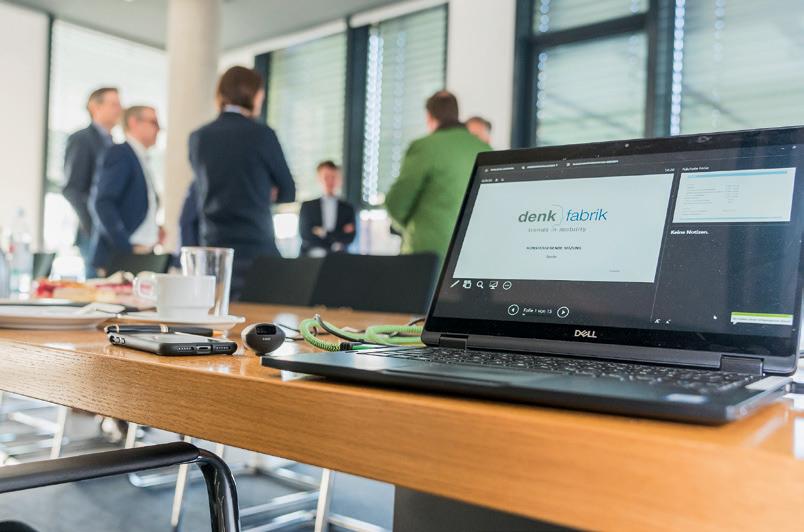
“THE LOGISTICS INDUSTRY IS VERY ROBUST”
Professor Christian Kille regularly uses logistics methods to forecast how the industry will develop. Especially in times of crisis, the value and strengths of German medium-sized companies become apparent.
A
s recently as February 2020, at the presentation of the current annual report of the Logistikweisen, the circle of experts around Professor Christian Kille held to a forecast of nominal 2.2 percent growth and 0.4 percent in real terms – despite the vaguely emerging developments this year. In their open letter in April, they revised this forecast significantly downwards. “In our view, the logistics sector will be much more severely affected than the German Council of Economic Experts predicts, with a minus of 2.8 to 5.4 percent for the economy as a whole,” says Christian Kille. “At the same time, experience shows that the logistics industry is very robust after all and will not only emerge from a deep valley, but can also provide significant support for the entire economy in its recovery”. He therefore advises people to have confidence instead of losing themselves in too much fear. Shortly before the editorial deadline, the logistics experts had included the SARS-CoV-2 virus in their report: “This is one of the examples of specific topics that can develop a special – and in this case devastating – momentum of their own that nobody had expected.”
EFFECTS TAKE TIME
Many of the forecasts again point out that the Corona crisis represents a valley that must be crossed in order to return to the development path. The current question is how wide the valley will be. Therefore, during the expected ascent, formative long-term developments whose effects will only be felt gradually in the coming years should not be ignored: digitization, changes in values and structures. And above these three major developments there is a big topic: sustainability. Especially in difficult times, the “long line” must not be forgotten, said Kille: “These issues affect and permeate all areas of logistics.” Only one thing is important for entrepreneurs: “They must be proactive and keep up with all these developments.” After all, it could take several years before, for example, digital tools and technologies are implemented in real operations and for the effects to be seen. Even with new business models and services, processes and offers are changing, and the market has to get used to these changes first. “Companies must first develop a certain basis so that they can bring sufficient effects to the market.”
ABOUT CHRISTIAN KILLE
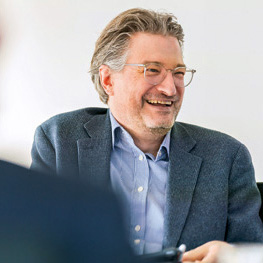
Christian Kille, born in 1972, has been Professor of Retail Logistics and Operations Management at the University of Applied Sciences Würzburg-Schweinfurt since 2011. In 2014, he co-founded the initiative “Prognosis for the Development of Logistics in Germany“ and is a member of the jury of the “Logistics Hall of Fame”.
CONSERVATISM AS AN ADVANTAGE
Kille points out that change happens continuously: “It has always been there. Every generation lives and acts differently – and is therefore no less happy than previous generations. In addition, there are many opportunities in most developments.” Christian Kille remembers the strengths: “We are an engineering country, and we are people who are innovative. We are a bit more conservative, but that can also be an immense advantage”. To achieve this, one should not overlook developments, but be open to upcoming adjustments and changes as well as new technologies and ways of working. “We are an affluent country and often don’t want to change much because prosperity has made us comfortable,” said Kille. “But if we get really hungry for change, our more conservative or cautious nature can be an advantage. This is where medium-sized companies can make full use of their strengths – especially large entrepreneurial families in logistics are pioneers in this field, because they often invest courageously in new topics”.
“WE NEED ALL MODES OF TRANSPORT”
As a specialist for combined transport, TX Logistik AG offers its customers a climate-friendly transport route. Berit Börke, sales director of the company, explains the potential of rail.
M
odal shift of road transport to rail is urgently needed,” says Berit Börke, Sales Director of TX Logistik AG. “The market environment, the potential of rail and also the challenge posed by climate targets clearly speak in favour of it”.TX Logistik, founded in Bad Honnef in 1999, is one of the largest rail freight transport companies in Europe. It sees itself as a specialist for borderless transport networks, within which TX Logistik is very active in combined transport – both continental and seaport inland. The demand from customers is high, reports Berit Börke: “We do see reservations about the rail system because of its greater complexity compared to the organisation of road transport. However, freight forwarders, industry and trade benefit from the advantages of stable, safe and resource-saving transport. This is reflected in many long-term customer relationships”. The demands placed upon businesses during the pandemic have contributed to increased attention and openness, while the European Green Deal stands for further reductions in CO2 emissions from freight transport. “Due to these ecologic needs, more companies are approaching us and want to find solutions together to get their freight on the rails.”
STRENGTHENING THE ROBUSTNESS OF THE NETWORK
The chances for a stronger switch to rail are there, the necessity is there too – but further prerequisites must be created for this, said Börke. “The infrastructure has a restrictive effect in some cases, for example in terms of the route network or terminal capacities. The infrastructure managers in Europe are not yet coordinating their activities sufficiently among themselves.” The uncertain economic development is also having an effect: “We are observing that the flow of goods is changing much faster or is currently more unstable, and we need high bundling capacities in rail transport.” These challenges have to be met with the appropriate framework conditions and secure, long-term financing. “The focus must be on making the rail networks more robust, expanding and making better use of train path and terminal capacities, and driving forward digitization at national and international infrastructure level for accelerated and integrated processes.”
ABOUT BERIT BÖRKE
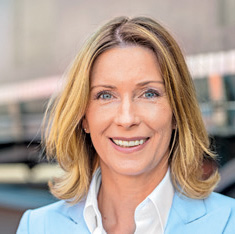
Since November 2017, Berit Börke has been Chief Sales Officer at TX Logistik, a private railway company with headquarters in Troisdorf, near Cologne, Germany. The graduate economist has been working in the transport industry for more than 20 years and is a member of the Logistikweisen, the German expert council for logistics.
REMOVE DISTORTIONS OF COMPETITION
With an annual growth rate of around three percent, combined transport was long regarded as the growth engine in rail freight transport. “However, in order to reduce emissions to the planned extent and relieve the roads, it must become significantly more,” says Börke. She called for the competitive conditions to be harmonised, for example by bringing the costs of using rail into line with that of road transport. The strong regulation of rail freight transport with different regulations in individual countries makes the service more expensive, she said. It is therefore a concern of hers that the regulations on this would also be harmonised within the European Union. Combined transport is resource-saving and very safe. “In this respect, I see less competition between rail and road than the task of activating the advantages of the various transport systems in such a way that new services are created,” explained Berit Börke. After all, in her view, all modes of transport are needed – whether road, rail, shipping or air freight – to ensure globally stable supply chains.
But the companies themselves are also in demand when it comes to product design. “We use systems such as ‘Nikrasa’ and ‘R2L’, for example, to make non-cranable semi-trailers suitable for rail transport or to transport semi-trailers and commercial vehicles with the same equipment. This combination of different loads enables us to achieve a more economical capacity utilisation and also makes rail freight transport more flexible.”
But the companies themselves are also in demand when it comes to product design. “We use systems such as ‘Nikrasa’ and ‘R2L’, for example, to make non-cranable semi-trailers suitable for rail transport or to transport semi-trailers and commercial vehicles with the same equipment. This combination of different loads enables us to achieve a more economical capacity utilisation and also makes rail freight transport more flexible.”
“WE HAVE TO BRIDGE THIS PERIOD”
Because there were no electric heavy-duty tractors on the market, the Allgäu forwarding company Ansorge developed its own with “Elias”: The electric truck is successfully used on short distances and is also intended to support further development for traditional manufacturers.
W
hen Spedition Ansorge had to assess its CO2 output in 2013, the idea was born to counter not only these statistics, but of course also the environmental pollution caused by the vehicles – with emission-free freight transport. As a medium-sized logistics company with a focus on contract logistics and a high proportion of transport, Ansorge serves short distances in road transport and long distances in intermodal transport, for example across the Alps. “Our vision was to handle short-distance transport in the future with electric vehicles and then to transport the goods – also green – by rail to their destination for longer distances”.
TAKING THE INITIATIVE
But at that time the traditional manufacturers did not have the corresponding vehicles. “Everyone told me that the technology was not yet fully developed,” remembers Wolfgang Thoma. “At that time, diesel was still considered to be future-proof, and Euro 6 was supposed to be the saviour. Of course, I was not satisfied with this statement, I looked for further possibilities, but found nothing. So we decided to try it ourselves. We wanted to develop a heavy-duty tractor that could pull 44 tonnes and could travel at least 80 kilometres per hour so that it could be allowed to drive on motorways”.
The Bavarian government helped with subsidies that stayed in the region: Together with the company Sensor-Technik Wiedemann and the workshop company Toni Maurer – both of whom, like Ansorge, are based in the Allgäu region – the haulage company was able to convert a standard MAN truck into “Elias”, a purely electrically powered powerhouse. The result has been in use since May 2019: “We have been testing the vehicle in local transport for almost a year and are extremely satisfied with it. This shows that electromobility is excellently suited for local transport and combined transport on short distances”. The electricity for Elias is to come completely from the company’s own photovoltaic systems in the future.
The Bavarian government helped with subsidies that stayed in the region: Together with the company Sensor-Technik Wiedemann and the workshop company Toni Maurer – both of whom, like Ansorge, are based in the Allgäu region – the haulage company was able to convert a standard MAN truck into “Elias”, a purely electrically powered powerhouse. The result has been in use since May 2019: “We have been testing the vehicle in local transport for almost a year and are extremely satisfied with it. This shows that electromobility is excellently suited for local transport and combined transport on short distances”. The electricity for Elias is to come completely from the company’s own photovoltaic systems in the future.
ABOUT WOLFGANG THOMA
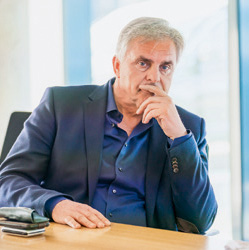
Wolfgang Thoma, born in 1955, is managing director and partner of the Ansorge GmbH & Co KG forwarding agency in Biessenhofen, Swabia. The law graduate was employed by its founder Erhard Ansorge as in-house counsel. In 1993 Thoma took over the management and became a shareholder of the company.
MORE PRESSURE ON THE MANUFACTURERS
Wolfgang Thoma demands that the pressure on commercial vehicle manufacturers should be increased: “In addition to politicians, the industry itself must also increasingly demand that vehicles be brought to market – not least in order to meet the everincreasing restrictions.” The manufacturers will be offering the first competitive heavy-duty tractors based on electric mobility for the next few years. “We have to bridge this period,” says Thoma.
He does not see the diesel disappearing so quickly: “In my opinion, it will continue to exist for the next 10 to 15 years. But the alternatives – battery-based e-mobility, fuel cells, hydrogen, gas and synthetic fuels – will gradually displace it. I think that for each application, an alternative power train technology will emerge.” Then the appropriate infrastructure is still needed, including charging stations; commercial vehicle manufacturers could also create these, Thoma believes: “They could join forces and provide these together instead of waiting for the politicians to come up with them.” As an entrepreneur, he himself did not wait, but took action. “We at Ansorge will never produce trucks, but we do feel that we can support further development for the traditional manufacturers and, with Elias, show them what vehicles we need. We have been used to manufacturers recognizing the spirit of the times and developing suitable products. But when it comes to alternative drive systems, they seem to have been in a deep sleep for a long time – and now they urgently need to wake up.”
He does not see the diesel disappearing so quickly: “In my opinion, it will continue to exist for the next 10 to 15 years. But the alternatives – battery-based e-mobility, fuel cells, hydrogen, gas and synthetic fuels – will gradually displace it. I think that for each application, an alternative power train technology will emerge.” Then the appropriate infrastructure is still needed, including charging stations; commercial vehicle manufacturers could also create these, Thoma believes: “They could join forces and provide these together instead of waiting for the politicians to come up with them.” As an entrepreneur, he himself did not wait, but took action. “We at Ansorge will never produce trucks, but we do feel that we can support further development for the traditional manufacturers and, with Elias, show them what vehicles we need. We have been used to manufacturers recognizing the spirit of the times and developing suitable products. But when it comes to alternative drive systems, they seem to have been in a deep sleep for a long time – and now they urgently need to wake up.”
“PEOPLE ARE AN INTEGRAL PART OF CHANGE”
Anthony Wandt, together with his sister Aline, took over the Braunschweig-based Wandt Spedition Transportberatung from his uncle and father. As a member of a new generation of entrepreneurs in logistics, how is he shaping the takeover?
Mr Wandt, how did the takeover of your company proceed?
There was no fixed date, it was a smooth transition. And it’s not as if we say: one day ago everything was old, and since then everything is new. Rather, it is an ongoing process that we are now continuing to shape in the third generation. As the industry changes, we adapt to it, follow the existing structures and develop them further. In any case, the generational change takes time. Among other things, we have the support of our father, who is no longer an owner but is still acting as managing director this year.
Do you orientate yourself on him and your uncle as role models, or do you rather form your own profile?
My sister and I both have our own profile. That certainly doesn’t provide for classic patriarchal leadership – but that didn’t exist before either, it doesn’t correspond to the culture of the company. We always keep in touch with our uncle and father. Of course, you work differently on certain things, but that’s certainly partly due to the fact that our generational change is taking place in the ever-faster era of digitalization. I see it as a great opportunity for us to shape the digitization process together with our employees.
There was no fixed date, it was a smooth transition. And it’s not as if we say: one day ago everything was old, and since then everything is new. Rather, it is an ongoing process that we are now continuing to shape in the third generation. As the industry changes, we adapt to it, follow the existing structures and develop them further. In any case, the generational change takes time. Among other things, we have the support of our father, who is no longer an owner but is still acting as managing director this year.
Do you orientate yourself on him and your uncle as role models, or do you rather form your own profile?
My sister and I both have our own profile. That certainly doesn’t provide for classic patriarchal leadership – but that didn’t exist before either, it doesn’t correspond to the culture of the company. We always keep in touch with our uncle and father. Of course, you work differently on certain things, but that’s certainly partly due to the fact that our generational change is taking place in the ever-faster era of digitalization. I see it as a great opportunity for us to shape the digitization process together with our employees.
ABOUT ANTHONY WANDT
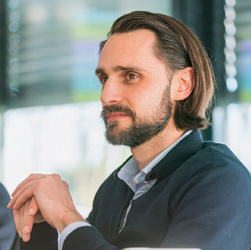
Anthony Wandt, born in 1981, is managing partner of Wandt Spedition Transportberatung GmbH. He took over this position in 2016 from his uncle Adalbert Wandt. The qualified forwarding merchant and transport specialist studied transport and logistics management and strategic management.
What are your priorities with regard to this development of your company?
We are already starting with the fact that we are not talking about digitalization in general terms, but about automating processes. The tools are mostly digital media, but of course we still work with people. Many of them don’t deal with the subject as intensively, and if you then only talk about digitization, it can quickly convey a feeling that employees should be eliminated. This is not the case at all, but people are an integral part of these developments and changes. As the Wandt company, we have been working with some employees for generations. In the end, we are always a small community that must function well. And there will never be a perfect world in which machines take over everything: People will always be sitting at an interface and will be needed.
What goals do you set yourself?
We want to continue to restructure the company so that we can survive in the market. In the long term, we also want to free ourselves a bit from market pressure and move even more in the direction of sustainability – both in terms of the environment and in terms of the employees in the company.
You participate in the Krone Denkfabrik – how do you experience working in this format?
As very positive and enriching! It’s really exciting when different minds come together at the same table, with a little distance to everyday life, to work out results that are relevant to the industry. It has already become apparent during the topic identification process: Everyone has different approaches, but you can still quickly find a consensus. In addition, it is a great opportunity to be able to exchange and network intensively with great entrepreneurs.
“WE’VE NEVER HAD TO STOP A TRUCK BEFORE BECAUSE WE DIDN’T HAVE A DRIVER”
The Hamburg-based Zippel Group is asserting itself in the fight against driver shortages with a whole range of measures. Managing Director Axel Plaß reports on his recipe for success.
T
he situation has eased slightly at present: Less economic growth also means that fewer drivers are needed. “They are still missing, of course, but the extreme pressure of recent years has eased,” says Axel Plaß, Managing Director of the Hamburg-based Zippel Group. “There are drivers on the market again.” In order to win them over, he believes that fair payment is the top priority: “If we are honest, good money should be paid from the start. It’s a fact – and similar for many jobs in Germany: anything that is dirty, wet or far away from home has to be compensated for with money. That’s what we as an industry have to prepare for.”
REGULAR WORKING HOURS
According to Plaß, working conditions are the most important thing besides wages: The Zippel Group relies heavily on combined transport and uses rail from Hamburg, Bremerhaven and Wilhelmshaven to Berlin, Schkopau and Leipzig. “This gives us the possibility of double-shifting the vehicles and we can offer regular working hours”. Because most drivers prefer to be able to come home every day. Axel Plaß knows: “It always becomes difficult when the guys are on the road the whole week or even longer. Then you need enthusiasts who really want to do it and are not tied up with their families.” But this “target group” can also be reached – with vehicles equipped with high-quality features. The Zippel Group invests an additional 10 to 15 percent of the total value in extras that drivers want: visual details, more horsepower and comfort or audio and video systems.
ABOUT AXEL PLASS
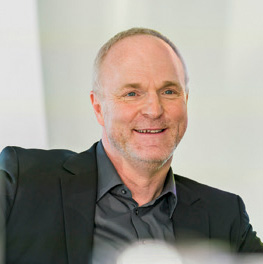
Axel Plaß, born in 1966, is managing partner of the Hamburg forwarding company Konrad Zippel –- where he initially worked as a driver. Since 2018 he has been president of the German Freight Forwarding and Logistics Association DSLV.
VALUE IS RETAINED
Drivers also handle these trucks much more carefully: “These vehicles not only have a higher resale value, but also less wear and tear and damage. When a regular driver drives, he simply handles them more carefully,” says Plaß. The costs are amortized over this: “We certainly cannot spend more money on vehicles than other haulage companies,” says Plaß. And the special trucks also attract attention on the road: “We receive many applications from candidates who have seen one of our vehicles on the motorway and have become aware of us through it”. The Zippel Group has been following this path for a long time: “This has carried us through very challenging times. We have never had to stop a truck because we didn't have a driver.”
HELP WITH ORGANISATIONAL MATTERS
With around 100 vehicles in its fleet, the Zippel Group employs a total of four fleet managers. They organise things for the drivers, for example, which they cannot do themselves during longer absences. “As an entrepreneur, it is far more convenient for me to hire a courier to pick up a doctor’s prescription with a power of attorney than for a driver to take the whole day off and I have to find another driver or the vehicle even stops,” says Axel Plaß. But despite all this: there is a lack of young talent. “And I don't see any real cure in the long term, except for financial compensation. Especially if you send the drivers on long journeys, the only way to make up for it is with a fair salary.”
Photos: Krone/Schöning Fotodesign, Jennifer Zumbusch Illustrations: G2WW




